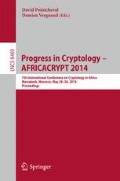Abstract
The Keccak hash function is the winner of the SHA-3 competition. In this paper, we examine differential propagation properties of Keccak constituent functions. We discover that low-weight differentials produce a number of biased and fixed difference bits in the state after two rounds and provide a theoretical explanation for the existence of such a bias. We also describe several other propagation properties of Keccak with respect to differential cryptanalysis. Combining our propagation analysis with results from the existing literature we find distinguishers on six rounds of the Keccak hash function with complexity 252 for the first time in this paper.
Access this chapter
Tax calculation will be finalised at checkout
Purchases are for personal use only
Preview
Unable to display preview. Download preview PDF.
References
Aumasson, J.P., Meier, W.: Zero-sum distinguishers for reduced Keccak-f and for the core functions of Luffa and Hamsi. NIST Mailing List (2009)
Bellare, M., Rogaway, P.: Random Oracles are Practical: A Paradigm for Designing Efficient Protocols. In: CCS, Proceedings of the 1st ACM Conference on Computer and Communications Security, pp. 62–73. ACM (1993)
Bernstein, D.J.: Second preimages for 6 (7?(8??)) rounds of keccak? NIST Mailing List (2010)
Bertoni, G., Daemen, J., Peeters, M., Van Assche, G.: The Keccak SHA-3 submission. Submission to NIST, Round 3 (2011)
Boura, C., Canteaut, A.: Zero-Sum Distinguishers for Iterated Permutations and Application to Keccak-f and Hamsi-256. In: Biryukov, A., Gong, G., Stinson, D.R. (eds.) SAC 2010. LNCS, vol. 6544, pp. 1–17. Springer, Heidelberg (2011)
Boura, C., Canteaut, A., De Cannière, C.: Higher Order Differential Properties of Keccak and Luffa. In: Joux, A. (ed.) FSE 2011. LNCS, vol. 6733, pp. 252–269. Springer, Heidelberg (2011)
Chang, S., Perlner, R., Burr, W.E., Turan, M.S., Kelsey, J.M., Paul, S., Bassham, L.E.: Third-Round Report of the SHA-3 Cryptographic Hash Algorithm Competition (2012), http://csrc.nist.gov/groups/ST/hash/sha-3/Round3/documents/Round3ReportNISTIR7896.pdf
Daemen, J., Van Assche, G.: Differential Propagation Analysis of Keccak. In: Canteaut, A. (ed.) FSE 2012. LNCS, vol. 7549, pp. 422–441. Springer, Heidelberg (2012)
Dinur, I., Dunkelman, O., Shamir, A.: Improved Practical Attacks on Round-Reduced Keccak. To appear in Journal of Cryptology
Dinur, I., Dunkelman, O., Shamir, A.: New Attacks on Keccak-224 and Keccak-256. In: Canteaut, A. (ed.) FSE 2012. LNCS, vol. 7549, pp. 442–461. Springer, Heidelberg (2012)
Dinur, I., Dunkelman, O., Shamir, A.: Collision Attacks on Up to 5 Rounds of SHA-3 Using Generalized Internal Differentials. In: FSE 2013. LNCS (2013)
Duan, M., Lai, X.: Improved Zero-Sum Distinguisher for Full Round Keccak-f Permutation. Cryptology ePrint Archive, Report 2011/023 (2011)
Duc, A., et al.: Unaligned Rebound Attack – Application to Keccak, http://eprint.iacr.org/2011/420
Morawiecki, P., Pieprzyk, J., Srebrny, M., Straus, M.: Preimage attacks on the round-reduced Keccak with the aid of differential cryptanalysis. Cryptology ePrint Archive, http://eprint.iacr.org/2013/561.pdf
Morawiecki, P., Pieprzyk, J., Srebrny, M.: Rotational cryptanalysis of round-reduced Keccak. In: FSE (2013), http://eprint.iacr.org/2012/546.pdf
National Institute of Standards and Technology. FIPS 180-1: Secure Hash Standard (April 1995), http://csrc.nist.gov
Naya-Plasencia, M., Röck, A., Meier, W.: Practical Analysis of Reduced-Round Keccak. In: Bernstein, D.J., Chatterjee, S. (eds.) INDOCRYPT 2011. LNCS, vol. 7107, pp. 236–254. Springer, Heidelberg (2011)
Peyrin, T.: Improved Differential Attacks for ECHO and Grøstl. In: Rabin, T. (ed.) CRYPTO 2010. LNCS, vol. 6223, pp. 370–392. Springer, Heidelberg (2010)
Rivest, R.L.: The MD5 message-digest algorithm. Request for Comments (RFC) 1320, Internet Activities Board, Internet Privacy Task Force (April 1992)
Wang, X., Yin, Y.L., Yu, H.: Finding Collisions in the Full SHA-1. In: Shoup, V. (ed.) CRYPTO 2005. LNCS, vol. 3621, pp. 17–36. Springer, Heidelberg (2005)
Wang, X., Yu, H.: How to Break MD5 and Other Hash Functions. In: Cramer, R. (ed.) EUROCRYPT 2005. LNCS, vol. 3494, pp. 19–35. Springer, Heidelberg (2005)
Author information
Authors and Affiliations
Editor information
Editors and Affiliations
Rights and permissions
Copyright information
© 2014 Springer International Publishing Switzerland
About this paper
Cite this paper
Das, S., Meier, W. (2014). Differential Biases in Reduced-Round Keccak. In: Pointcheval, D., Vergnaud, D. (eds) Progress in Cryptology – AFRICACRYPT 2014. AFRICACRYPT 2014. Lecture Notes in Computer Science, vol 8469. Springer, Cham. https://doi.org/10.1007/978-3-319-06734-6_5
Download citation
DOI: https://doi.org/10.1007/978-3-319-06734-6_5
Publisher Name: Springer, Cham
Print ISBN: 978-3-319-06733-9
Online ISBN: 978-3-319-06734-6
eBook Packages: Computer ScienceComputer Science (R0)

